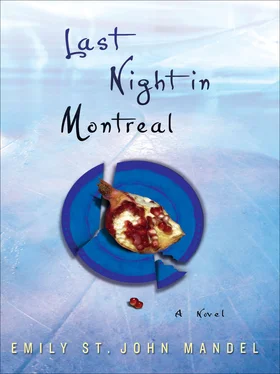In Chicago there was Erica. Lilia was twenty-two years old by then, getting a little tired and beginning to think about New York, which was one of the few cities in the United States where she had never been; she stayed in Chicago for two months and then left with very little warning. On the last night she got into an argument with Erica, and they sat together in silence for a long time afterward at a table by the railing on the high mezzanine of Erica’s favorite bar. Erica sipped her beer and gazed down over the edge. It was close to midnight, and a waitress had brought a candle to each table; the candles flickered individually in the dimness and Lilia stared blankly at the hundred scattered bits of flame, thinking of what New York City might be like and how she might get out of the bar without making Erica cry again.
Erica moved her glass in front of the candle. The flame shining through it transformed her beer into a glass of pure light. It took a moment for Lilia to realize that Erica was speaking to her.
“I’m sorry. What were you saying?”
“That waitress,” Erica said “I was saying she’s interesting, don’t you think?” She was looking down over the mezzanine railing. The girl who’d brought the beer and the candlelight was wiping down a table by the bar, and to Lilia’s eye she wasn’t fascinating at first glance: white shirt, black pants, well-executed ponytail, autopilot expression, red lipstick.
“What’s interesting about her?” Lilia was distracted and upset, thinking of tomorrow morning’s bus schedule and never seeing Erica again, and from the mezzanine the waitress just looked like any other waitress. One thing that had begun to trouble Lilia lately was the way that sometimes all people and all cities looked the same to her.
“She has a tattoo on the back of her wrist,” said Erica dreamily. “You can see it when she reaches for things.” She was watching the girl wipe the surface of a dark wood table.
“So?”
“I like waitresses with tattoos,” Erica said. “It implies the existence of a secret life.”
Lilia liked this idea, although she didn’t tell Erica that, and she saw what Erica meant when the waitress brought a new ashtray. The tattoo was a snake biting its own tail, in a perfect bluish-green infinite circle on the back of her left wrist.
“It’s a good tattoo,” Lilia said, but Erica’s thoughts were already elsewhere; she was smiling at Lilia now, looking at her consideringly; she pushed a long strand of blue hair back from her face before she spoke.
“I still think it’s courageous, Lilia,” she said brightly, picking up the scent of the earlier argument, “whatever you want to call it.”
Lilia sighed and sipped halfheartedly at her wine, wishing she was gone already. She had decided earlier in the evening never to give anyone advance warning of departure ever again.
“I mean, I know you think it’s nothing, but it just impresses me. I could never do that. Just pack up and go like that, without any warning, or almost none, to just pick up and move your whole life. .”
“There’s nothing very brave about it, actually. I didn’t say it was nothing, I just said it isn’t courageous.”
“Please.” Erica was momentarily distracted by her pint of beer. “Do you even know anyone in New York City?”
Lilia shook her head. She was playing idly with two empty cigarette boxes, combining them with the salt and pepper shakers to build an unstable little house.
“Do you have a place to stay?”
“No.”
“A job?”
“I’ll find something.”
“There, you see?” Erica leaned back in her chair as if she’d just proved something. Her smile bordered on smug. “ That’s courage,” she said, “whatever you want to call it.”
“You don’t understand.” Lilia found at that moment that she had no patience for anything: for this city, this street, this relentlessly trendy split-level bar, the identically dressed waitresses gliding between tables, this blue-haired girl across the table with the beer. The sadness of the waitress’s blue-green snake tattoo, circling forever on the same tired wrist. She let her cigarette-box house fall down in disarray. “It isn’t courage, Erica, it’s exactly the opposite. There’s nothing good about it. It’s exactly like running away from everything that matters, and I wish I could make you understand that.”
“Please. How many places have you moved to since you went out on your own?”
“Since I was sixteen? I don’t know. Maybe twenty. Probably more. But you’re still missing the point completely.”
“Just in the last two years, say. How many have you moved to in the last two years?”
“I don’t know, Erica. You’re still not getting this. It’s just, listen, I’ve never moved to anywhere in my life. When I show up in a city, it doesn’t mean I’m arriving, it only means. . when I show up,” Lilia said, floundering now, repeating herself, “I’m not arriving anywhere, I’m only leaving somewhere else.”
“I still think—”
“You’re not listening. You don’t get it. It isn’t admirable. I cannot stop. All I ever do is leave, and I apparently don’t even do that very well, since you’re sitting there starting to cry because I’m leaving tomorrow, and I’m always running out of time. I am always running out of time. Are you completely incapable of understanding this? This, is all, I ever, do, and there is absolutely nothing admirable about it.”
Erica was stricken. The tears were starting to win. This only made her more beautiful, and Lilia thought she might die if the moment didn’t end, so she stood up and moved around the table and kissed the blue hair that she’d already kissed so many times. The kiss released a sob, and Erica held one hand over her eyes, her face shining in the candlelight. Lilia was moving quickly past her, down the stairs and out onto the sidewalk, where the Friday-night crowd moved around her like ghosts. She fumbled in her jacket pocket for her cell phone and dialed as she walked down the crowded sidewalk; she crossed the street quickly and stood in a doorway while the call went through.
“It’s good to hear your voice,” her father said. There was a baby crying in the background, her latest half-sibling, and she could hear his girlfriend’s soothing voice. The sounds brought her back to his house in the desert, the smell of French fries in the diner where her father’s girlfriend worked, long walks down cracked streets in the cool desert twilight, and she closed her eyes against the sheer oppositeness of the cold bright city. “Where are you?” he asked.
“Still in Chicago.” She forced her voice to be light. “But I wanted to call and tell you that I’m moving to New York City tomorrow.”
“New York New York,” he said. “Fine choice, kiddo. I spent some years there. Do you need money?”
“I’ll find another job.”
“I’ll send you a wire transfer tomorrow.”
Across the street, some distance down the block, Erica had emerged from the bar. She had an unsteady look about her. She stood on the edge of the sidewalk, looking up and down the street. Lilia sank back into the doorway for a moment, then changed her mind and walked away quickly.
“Do you know what’s strange?” she asked.
“What’s that, my dove?”
“I thought I saw the detective in St. Louis a couple of months ago. I walked out of a deli, and there was a man across the street with that same kind of hat, that fedora thing. He had a cane. He was just stepping into another store, and I couldn’t see his face, but I felt like he was watching me, just for that instant when I came out of the deli.”
“Is that why you left St. Louis?”
Читать дальше












